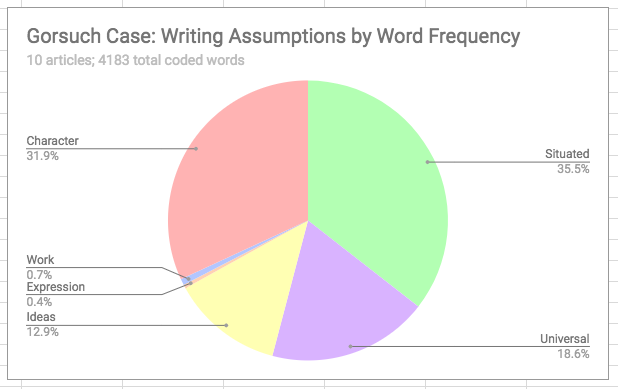The Gorsuch Case
Of Rules and Expectations, or Who Judges Plagiarism?
Gorsuch Intro
President Donald Trump nominated then federal appeals court judge Neil Gorsuch to the Supreme Court in January 2017 (Hirschfeld Davis & Landler, 2017). Media coverage focused on which Democratic senators would vote to confirm Gorsuch and whether Senate majority leader Mitch McConnell would take “the nuclear option” and end the filibuster on Supreme Court justices, in essence allowing Gorsuch to be confirmed by a bare majority rather than the tradition of at least sixty senators (Schmidt & Weiland, 2017). With McConnell committed to confirming Gorsuch by any means possible, and with Gorsuch causing no stir in the confirmation hearings, the nomination seemed assured.
This changed when Buzzfeed’s Chris Geidner (2017) and Politico reporters John Bresnahan and Burgess Everett (2017) each published articles claiming Gorsuch’s 2006 book, The Future of Assisted Suicide and Euthanasia, seemed to contain instances of poor citation and outright plagiarism. The Politico article turned media attention to Gorsuch’s academic writing--both the book under accusation and his Oxford dissertation that formed its basis. Bresnahan and Everett (2017) asked academics from both law and writing studies, including Rebecca Moore Howard, to weigh in on the plagiarism allegations, with some dismissing the charges and others, like Howard, arguing that the copied text represented intentional plagiarism.
These expert opinions were recirculated in other media outlet reports (e.g., Logan, 2017). In my database search, I identified ten articles which offered an argumentative response to Gorsuch's alleged plagiarism, with opinion pieces coming from sources ranging from The Washington Post to Princeton University’s student newspaper. Those condemning Gorsuch tended to argue from the universal assumption about writing, while those defending him focused on writing as situated and about ideas. Both sides assumed character was revealed, sometimes that of Gorsuch, sometimes that of his accusers and critics.
"the unattributed borrowing seems to consist only of the presentation of rather dry facts—and not any argument or original idea borrowed without attribution, which would be heavy-duty plagiarism. The defenders are also right that this sort of paraphrase is actually fairly common in judicial opinions." —Noah Feldman, 2017
"there are a few instances in which Gorsuch was sloppy in failing to properly attribute a source. One passage in particular is concerning and would merit investigation under the academic standards with which I'm familiar. That's unfortunate, but I don't think it has a significant bearing on his fitness for the court." —Jonathan H. Adler, 2017
Coding Results
In the Gorsuch case, writing as situated appeared most frequently. This is mostly due to a specific argument that appeared across multiple articles, namely "Supreme Court nominee Neil Gorsuch is not a plagiarist, according to the woman from whom he has been accused of lifting materials" (Adams, 2017). This particular kind of situated argument maintains that the author whose work was allegedly plagiarized should judge the offense. Reports showed Gorsuch's book replicating text from an article by Abigail Lawlis Kuzma. In response, Kuzma issued a statement, declining to name the repetition plagiarism, which was repeated in multiple defending arguments (e.g., Adams, 2017). Her argument relies on the assumption that writing means ideas and discounts the view that writing takes work.

While arguments from the Writing is Situated assumption tended to exonerate Gorsuch, those making character inferences split between condemnation and support. Some argued the evidence undermined Gorsuch's credibility, such as an opinion in Princeton University's student newspaper: "Particularly for someone whose mode of judicial interpretation, originalism, depends on fastidious attention to detail, research, and historical accuracy, Judge Gorsuch’s casual plagiarism bodes poorly for a real commitment to an objective, as opposed to an ideologically-driven, mode of interpreting the Constitution" (Krane, 2017). Others argue the character revealed here remains worthy: "It doesn’t impugn Gorsuch’s character. He’s not perfect, it turns out. Know what? No one is" (Feldman, 2017). Aaron Blake (2017) proffered a different interpretation: "It's definitely not nothing. At the very least, it's not something you'd want to do in your own written works for fear of opening yourself up to charges of plagiarism and poor attribution. The comparison to the Indiana Law Journal article is unmistakable." In this way, those arguing for character often assumed the plagiarism charges were true, while those excusing Gorsuch focused first on situation-based arguments to minimize or outright deny the charge. Then they attempted to ameliorate character damage.
Another argument from character turned on those conducting plagiarism research: "Politico discloses that its report is based upon 'documents provided to Politico' (perhaps by one of those 'dark money' groups that Sen. Sheldon Whitehouse, a Democrat of Rhode Island, is so concerned about). What Politico does not report is that much of the material it was provided did not pan out" (Adler, 2017). Questioning the character of those reporting plagiarism deflects from the issue but it also taps into a long-standing distaste for plagiarism-hunting.
Circulating Theories of Writing
Writing is Situated sees discourse communities as setting citation norms; insiders and plagiarizers judge best; professional standing refutes plagiarism.
Writing Requires Work assumes all writing requires intellectual labor (Roach, 2017) and so all writing deserves source-crediting; the writing process is difficult.
Writing Means Ideas takes up the solitary genius definition of writing, where novel ideas and original arguments matter and boilerplate language or facts do not.
Some of Writing is Universal argues some writing principles, e.g., giving credit, apply to all situations; college teaching and plagiarism policies serve as general benchmarks.
Writing Reflects Character views the act of writing as inherently ethical; intention matters, and writing decisions reflect one's overall character.
Writing Means Expression all work is intertextual, so the form and language used to convey ideas is what matters; reworking ideas is fair use.